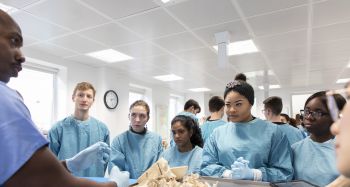Anatomy team successfully passes Human Tissue Authority inspection
By: Matt Bemment
Last updated: Friday, 29 November 2024

The Anatomy Suite at BSMS is open to both students and the public through its two licences
The Anatomy team at Brighton and Sussex Medical School (BSMS) has successfully passed a rigorous inspection conducted by the Human Tissue Authority (HTA) in October 2024. The HTA is the national independent regulator for organisations that remove, store and use human tissue for research, medical treatment, post-mortem examination, education and training, and display in public.
The Anatomy Suite at BSMS holds two HTA licences: one for Anatomical Examination, which it has held since 2007, and another for Public Display, obtained in 2019. Each of these licences have specific codes of practice and standards attached to them to ensure the safe and ethical use of human tissue and the dignified and respectful treatment of the deceased. Inspections involve establishments being tested against these standards which are grouped into the following:
- Consent
- Governance and quality systems
- Traceability
- Premises, facilities and equipment
The HTA was established in 2005 following the Human Tissue Act 2004, which mandates first-person written consent from individuals wishing to donate their bodies for medical purposes after death. Each licensed establishment must have a ‘Designated Individual’ (DI) who is legally responsible for ensuring that the activities carried out under the licence comply with the Human Tissue Act 2004. The DI may assign Persons Designate to staff members who work closely under the licensed activities. At the time of the recent inspection, Prof Claire Smith was DI for Anatomical Examination and Public Display licences while Head of Anatomy, Dr Catherine Hennessy, was on a period of leave. The Corporate Licence Holder for the University of Sussex, where the Anatomy Suite is based, is Prof Keith Jones.
This recent inspection, which comprised of a remote inspection in September and an on-site inspection in October, was triggered by the scheduled inspection of the Public Display licence but encompassed an inspection of both licences. These inspections occur approximately every five years, with the last one for Anatomical Examination taking place in 2021.
BSMS’ Anatomy team receives human material from various sources, primarily through the London Anatomy Office, which distributes donors across nine medical schools in the London and South East region. Additionally, prosections (dissected body parts) for surgical and clinical training are obtained from the Nottingham Repository and Science Care (USA). Other donations include historical specimens from universities, museums, or individuals who have inherited anatomical material. The collection held includes around 30 full body donors, 500 prosections, thousands of real bones and 190 potted specimens (human material displayed in a glass pot). Materials regulated under the Anatomical Examination licence are primarily used for medical and healthcare education, training and research. Selected items can be used in public events and are held under the Public Display licence.
Dr Catherine Hennessy, Head of Anatomy at BSMS, said: “Although they can be daunting, the HTA inspections allow us to receive crucial feedback from the regulator on how we can continue to improve our practices and procedures. I am so proud of the whole anatomy team who worked tirelessly in the lead up to, and during, the inspection to ensure that we passed with flying colours! We received no noted shortfalls, only recommendations, which highlights the robustness of the work we do in anatomy. A highlight for me from the feedback session with the inspectors was that they noted how clean and well-maintained the facility is and that the whole team was actively involved in the inspection process, not just the Designated Individual and Head of Anatomy, which is the ethos we hold within the BSMS Anatomy team – teamwork.”
In recent years, donors have been able to provide additional consent for public display, enabling the anatomy department to use recently donated materials for educational events. BSMS is proud to be at the forefront of this initiative, setting a global standard in this emerging area.
The inspection process involved months of preparation in the lead up to the inspection dates in September and October. Since May 2024, the team, led by Designated Individual (at the time) Prof Claire Smith, submitted extensive governance documentation, including Codes of Conduct, Standard Operating Procedures, Risk Assessments, consent-taking protocols and staff training logs. The final part of the inspection was a feedback session with the HTA inspection team. This was attended by the entire anatomy team as well as Prof Keith Jones, and the Dean of the medical school, Prof Richard McManus.
Prof Smith, Professor of Anatomy at BSMS and Deputy Pro Vice Chancellor (Education and Innovation) University of Sussex, said: “One of the recommendations is the Designated Individual expands auditing systems in light of outcomes from the Fuller Inquiry, to further ensure the dignity and care of the deceased. Of course, BSMS Anatomy supports these measures and have coincidently been participating in Part 2 of the Fuller Inquiry where selected anatomy departments have been asked to give evidence in ensuring that the security and dignity of the deceased is maintained.”
This successful inspection underscores the Anatomy team’s commitment to ethical standards and excellence in teaching, training, and research. Reports from the inspection are publicly available on the HTA website here for the Anatomical Examination licence and here for the Public Display licence.

